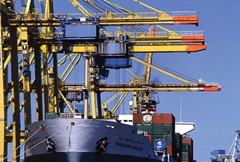Keeping Europe moving
A summary of the EU’s priorities for each transport sector. Greater competition and integration, allied with strong enforcement of safety rules, is the major theme across all policy areas.
The liberalisation of the air transport market has been one of the most tangible EU achievements for its citizens. Since the 1990s, fares have dropped and a greater range of airlines now fly over a wider variety of routes. Any EU-based airline may operate on any route within the union.
Since 2004, the EU has also influenced air traffic management. The Single European Sky project involves closer co-ordination between national air traffic services and is now being extended to neighbouring countries. The Commission is also pressing for more efficient processes and better noise management at airports.
Officials are currently looking at how to regulate civilian unmanned aircraft systems (drones) which are increasingly being used by police forces and the private sector. Draft plans were outlined in April.
Aviation accounts for 2-3 per cent of global CO2 emissions. The Commission aims to reduce this carbon footprint through the introduction of cleaner technology, more efficient air traffic management, and including aviation in the EU’s emissions trading scheme. The latter move has been stalled by opposition from airlines and other countries (including the USA) which maintain that the EU has no power to regulate their airlines.
Common safety and security rules apply across the EU, airlines with poor safety records are banned from European airspace, and the Commission gathers evidence on the causes of accidents. The EU has observer status at the International Civil Aviation Organisation in Montréal.
The major thrust of EU road policy since 2009 has been to simplify existing law and improve road safety. The Commission’s transport website (ec.europa.eu/transport) highlights differences in national driving rules and collates information on road safety strategies.
EU rules also regulate haulage contractors through four basic criteria: ethical conduct; good financial standing; professional competence; and an “effective and stable establishment” in a member state. The Commission also seeks to ensure good labour standards for employees in the transport sector, fair competition between companies, and less fatigue among drivers (through a balance of driving time and rest periods).
Bus and coach operators which carry passengers across national borders must possess a ‘community licence’ issued by their national government; this allows free access to all member states. The Commission sees road charging as a useful revenue generator.
Fuel duty is harmonised across the EU with member states having the flexibility to set their own taxes within those limits. Ireland is one of only four member states which drive on the left, the others being the UK, Malta and Cyprus.
Rail policy is a major interest in continental Europe – where it competes with aviation – but less so in Ireland due to the relatively short length of its network. The Commission’s priorities in this sector and greater competition (where possible), improved interoperability and safety on networks, and infrastructure development.
Freight services were liberalised in 2007 and passenger services in 2010. Infrastructure investment focuses on six trans-European network corridors, one of which links Ireland with the UK, French and Belgian networks. The Fourth Railway Package, launched last year, would increase the integration of the market and is currently on the agenda of the new European Parliament.
Interestingly, Malta and Cyprus have no railways but still have a say in rail policy as all EU member states must be consulted.
Policy
Transport is handled by the Directorate-General for Mobility and Transport. The outgoing Commissioner is Siim Kallas, a former Prime Minister of Estonia, and a successor will be appointed in the autumn. The portfolio lends itself easily to European co-operation and has existed since 1958. Its current Director-General is João Aguiar Machado, from Portugal.
Four agencies help to implement EU transport policy: the European Aviation Safety Agency (Cologne); the European Maritime Safety Agency (Lisbon); the European Railway Agency (Lille); and the Innovation and Networks Executive Agency (Brussels).
EU-based companies have the right to carry passengers or goods by sea between the ports of any member states (or from any of those ports to offshore installations in their waters). Investment in ports is concentrated on four ‘motorways of the sea’ and Ireland is located on the western European route which stretches from the North Sea to Portugal.
The Commission sees Europe’s network of ports as an “engine for growth” and is therefore keen to reduce traffic congestion on adjoining roads. It also points out that fewer and fewer Europeans are ‘going to sea’ and is keen to reverse this trend – and ensure that knowledge of the sea is passed on to a new generation.
The five landlocked EU countries (Austria, the Czech Republic, Hungary, Luxembourg and Slovakia) take part in discussions on maritime policy and indeed host some marine-related industries. The countries along the Danube and Rhine have a strong interest in keeping those inland waterways open and making them more efficient.









